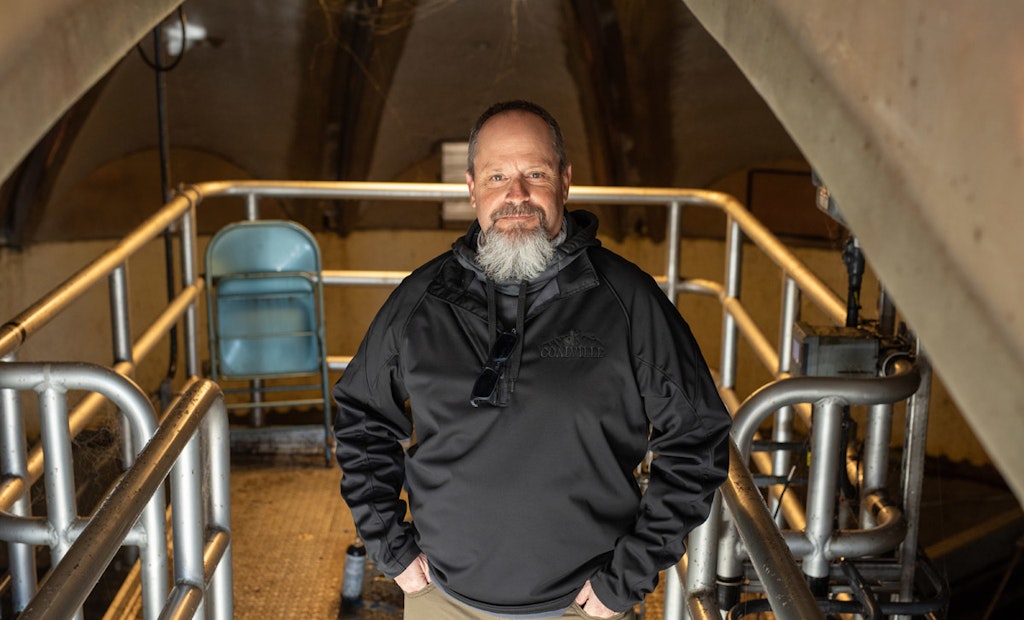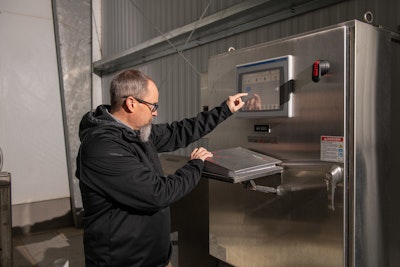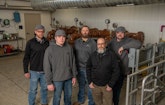
Coalville City (Utah) Public Works Director and 2020 Water Operator of the Year award winner Zane DeWeese at the Coalville Wastewater Treatment Plant. (Photography by Douglas Barnes)
Interested in Infrastructure?
Get Infrastructure articles, news and videos right in your inbox! Sign up now.
Infrastructure + Get AlertsFrom humble beginnings as a seasonal worker, Zane DeWeese has helped his hometown create a sustainable water management plan and secure safe drinking water supply.
As public works director and head of the Water Department in Coalville City, Utah, DeWeese has drawn on opportunities provided by mentors, and on lifelong study, to build a long and rewarding career.
His achievements include working with the city’s consulting engineers to create a water master plan, setting Coalville up for future growth and the ability to meet its water requirements in a sustainable manner. For his efforts he received the 2020 Water Operator of the Year award from the Rural Water Association of Utah.
Starting out
DeWeese entered public service in 1986 as a part-time seasonal worker in Coalville. After three months of hard work and on-the-job training, he earned a full-time position. In 1997 he took an opportunity to work with the Summit County (Utah) Health Department as an environmental health technician, a position he enjoyed for 17 years.
During that time he wore many hats and learned a great deal about water standards, treatment processes and distribution systems. He developed a keen interest in drinking water and, with the help of mentors and schooling, he obtained his drinking water certificate. In 2013, he returned to Coalville as public works director.
“I was blessed to have many mentors along the way,” he says. “Without them I wouldn’t have been able to learn what I needed to handle the job I have today.” Three mentors stand out as instrumental to his career growth. Doug Moore, his first boss at Coalville City, went to bat for him to be hired full-time and provided his introduction to the water industry.
Roy Dixon, his senior co-worker at Summit County, was a generous teacher, working side-by-side with DeWeese in the field and coaching him on the finer points of water chemistry and biology. Steve Jenkins, health director for the county, gave him responsibilities that were a catalyst to expand his technical knowledge and acquire management skills.
Today, DeWeese incorporates the lessons learned from the mentor/apprentice approach to leading his own crew.
High morale
Coalville City is a bedroom community of 1,500 people, 45 miles east of Salt Lake City and 20 miles east of Park City. Being born and raised in a rural mountain community, DeWeese understands and accepts the accompanying challenges. The city must run lean with small crews; leaders and team members need to multitask and cross-function.
Besides DeWeese, the team consists of Kyle Clark, public works foreman; Samuel Adams, lead wastewater treatment plant operator; and Russell Larson and Colby Smith, maintenance operators. DeWeese gives his crew opportunities to learn and try new things, working with them in the field just as his mentors did so that everyone can share knowledge, implement ideas and grow.
This approach keeps morale high and team members accountable to each other. DeWeese set up a financial rewards program to recognize staff members who take the extra steps to ensure projects’ success and make a difference in the community.
DeWeese admits that although it can be stressful, he enjoys the problem-solving aspects of his position and, on the flip side, the simple maintenance tasks. “There are days that I go out there and work side by side with my guy,” he says. “It can be some of the simplest tasks, maybe in some people’s minds menial tasks, but I enjoy those days, the camaraderie, working with my team, interacting with the residents. It’s great.”
Less loss
DeWeese’s first priority when he stepped into his director role was to work on the water master plan. To execute the plan he needed to equip his team with the right tools. The bulk of the equipment on hand when he took the job was at the end of or past its service life. He acquired a new John Deere 310S backhoe, a John Deere 50G mini-excavator, tool trailers, updated safety gear and new service vehicles.
The water master plan was aggressive and extensive. It included the replacement and upsizing of the Icy Springs No. 1 storage tank to a capacity of 600,000 gallons; the rehabilitation of the Lewis Well, which provided the city’s water supply; and the upgrading and upsizing of almost all water distribution lines within the city limits.
Most of the potable system (or culinary water system as it is called in Coalville) was 40 to 50 years old or more, and crews typically repaired several leaks each month to keep it functioning. “Coalville is kind of a geological wonder,” DeWeese says. “Some of our older lines had been in the ground for more than 50 years, and because of the depth and terrain, leaks going on in the system would never surface and be detected,” Deweese shares.
In 2019, nearly 20,000 linear feet of pipe was replaced, and most of the city’s system is now new. Unlike major metropolitan areas that can afford cutting-edge assessment and reporting technology, Coalville relied heavily on its crews’ knowledge of the system’s history to assess and analyze the results of the master plan and in particular the effects of the line replacements.
“We hoped that the replacement and upsize would be a two-for-one solution,” DeWeese says. “So changes in our storage tank levels against historical usage would be a strong indicator of success.”
Sure enough, the city immediately noted a decline in water loss because of the line replacements in the form of a steady increase in tank water levels.
Maintaining health
During the plan development, the city also recognized that its water supply from underground springs and wells was becoming unstable. The city consumed an average of 275,000 gpd of culinary water, and DeWeese spent many sleepless nights concerned about adequate water supply during drought years.
Studies determined that the existing sources would have to be augmented, but the new source would require treatment, something Coalville previously had not needed. Water is delivered straight from underground into holding tanks to receive chlorination before distribution. The new water treatment plant will draw from the Weber River by way of a pump station and will treat both river water and shallow well water.
In addition to concerns over adequate supply, Coalville had been paying the Weber Basin Water Conservancy District, a wholesaler, $15,000 per year to hold 300 acre-feet of Weber River water in reserve, and more than $29,000 per year to use 110 acre-feet of its water. The new water source and treatment plant will eliminate those costs, make the city more water resource independent, and help the utility maintain financial health.
Top operator
The community’s citizens and leaders took notice of DeWeese’s work to set a course to independence and to create a strong plan for the future. The mayor, city engineer and city staff members nominated him for the Operator of the Year award, a recognition he was surprised and humbled to receive.
“It comes down to taking pride in what you do,” DeWeese says. “Know going in that water and wastewater is a challenging industry that offers not just a job but a meaningful career. A career in our industry has many demands. Our customers are not aware of what it takes to deliver that clean, healthy water to the tap. For me, it’s about knowing the difference we can make, even if no one else can see it.”







